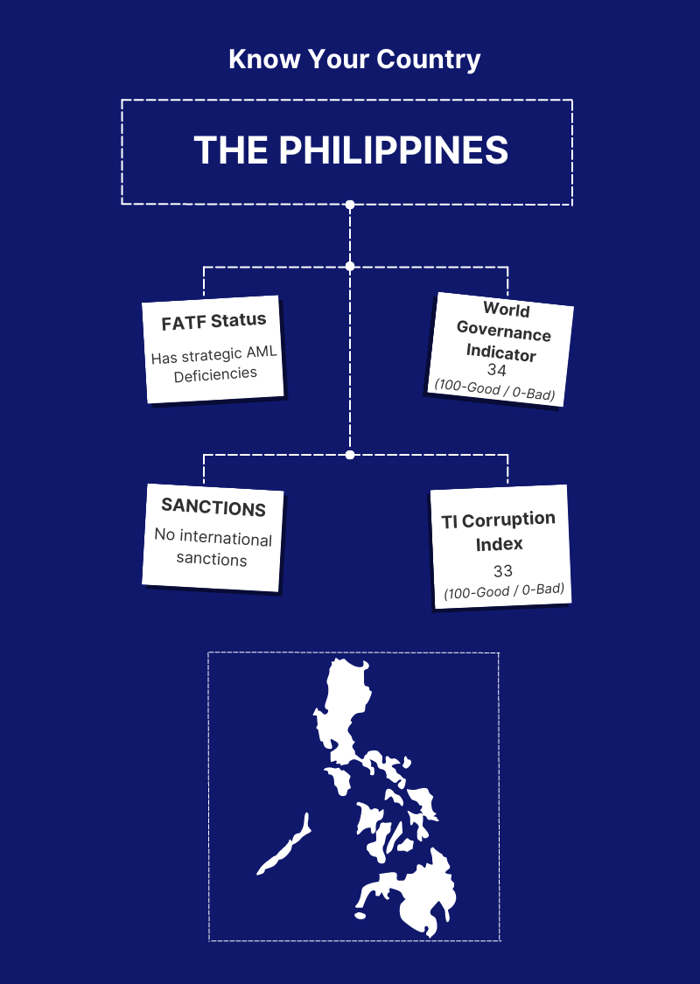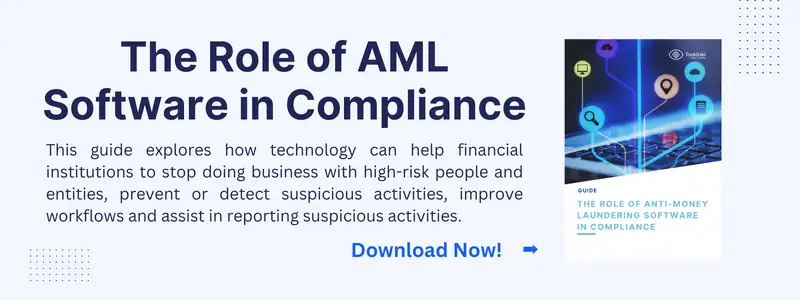Anti-money laundering (AML) compliance is a crucial aspect of the financial sector in the Philippines, aimed at preventing and detecting money laundering and terrorist financing activities. Money laundering has been a persistent issue in the Philippines, with its significant economic implications and potential to disrupt financial stability. To combat these illicit activities, the Philippines has implemented a robust regulatory framework, including the Anti-Money Laundering Act (AMLA) and the establishment of the Anti-Money Laundering Council (AMLC). Adhering to AML compliance is not only a legal obligation for financial institutions but also a crucial measure to maintain their integrity and reputation in the global financial landscape.
Tookitaki is a leading provider of innovative AML compliance solutions designed to help businesses in the Philippines and worldwide effectively manage their AML risks and obligations. By leveraging advanced technologies such as machine learning, Tookitaki's solutions enable financial institutions to enhance the efficiency and accuracy of their AML processes, including transaction monitoring, customer due diligence, and risk assessments.
By partnering with Tookitaki, businesses can streamline their AML compliance efforts, reduce operational costs, and ultimately contribute to a safer and more transparent financial ecosystem in the Philippines.
AML Regulations and Enforcement in the Philippines
Overview of the Anti-Money Laundering Act (AMLA)
The Anti-Money Laundering Act (AMLA) is the primary legislation governing AML compliance in the Philippines. Enacted in 2001 and amended several times since then, AMLA aims to prevent and penalize money laundering and terrorist financing activities. The Act defines money laundering offences, outlines reporting and record-keeping requirements, and establishes a framework for freezing and forfeiting assets related to illicit activities. AMLA applies to various entities, including banks, securities dealers, insurance companies, and money service businesses.
Role of the Anti-Money Laundering Council (AMLC) and other regulatory bodies
The Anti-Money Laundering Council (AMLC) is the central authority responsible for implementing and enforcing AMLA in the Philippines. Established under AMLA, the AMLC comprises the Governor of the Bangko Sentral ng Pilipinas, the Commissioner of the Insurance Commission, and the Chairperson of the Securities and Exchange Commission. The AMLC is responsible for monitoring and supervising covered institutions, investigating money laundering and terrorist financing offences, issuing regulations and guidelines, and coordinating with international organizations to combat money laundering.
In addition to the AMLC, other regulatory bodies, such as the Bangko Sentral ng Pilipinas, the Insurance Commission, and the Securities and Exchange Commission, play a crucial role in enforcing AML compliance within their respective sectors.

Key requirements and obligations for financial institutions
Under AMLA and its implementing rules and regulations, financial institutions are required to comply with various AML obligations, including:
- Customer Due Diligence (CDD): Financial institutions must perform CDD measures when establishing business relationships, conducting transactions above a specified threshold, or when there is suspicion of money laundering or terrorist financing.
- Record-keeping: Covered institutions must maintain records of customer identification documents, account files, and transaction records for at least five years.
- Reporting: Financial institutions must submit Suspicious Transaction Reports (STRs) and Covered Transaction Reports (CTRs) to the AMLC for transactions that meet specific criteria or are deemed suspicious.
- Risk Assessment: Institutions must conduct periodic risk assessments to identify, assess, and mitigate money laundering and terrorist financing risks.
- Compliance Program: Financial institutions must establish and maintain an AML compliance program that includes internal policies, procedures, and controls, as well as appointing a designated compliance officer responsible for overseeing the program.
By adhering to these key requirements, financial institutions can effectively manage their AML risks and contribute to the fight against money laundering and terrorist financing in the Philippines.
Challenges Faced by Financial Institutions in the Philippines
High-risk industries and sectors
Financial institutions in the Philippines face unique challenges due to the presence of high-risk industries and sectors within the country. The gaming sector, for instance, has experienced rapid growth in recent years, increasing the potential for money laundering activities. Remittance and money service businesses, which are essential for the millions of overseas Filipino workers sending money back home, are also considered high-risk due to their vulnerability to money laundering and terrorist financing schemes.
Emerging threats and trends in money laundering
The evolving landscape of financial crime presents new challenges for financial institutions in the Philippines. Cybercrime, such as online fraud and phishing attacks, has increased, posing significant risks to the financial sector. Additionally, the growth of digital financial services and cryptocurrencies has created new avenues for money launderers to exploit. Financial institutions must continuously adapt their AML compliance programs to effectively address these emerging threats and trends.
Compliance burden and the cost of non-compliance
Implementing a robust AML compliance program can be resource-intensive and costly for financial institutions, especially for small and medium-sized enterprises. The compliance burden includes hiring and training compliance staff, investing in AML software, and conducting regular audits and assessments. However, the cost of non-compliance can be even more significant, as financial institutions may face substantial fines, reputational damage, and loss of business due to regulatory enforcement actions. Thus, it is crucial for financial institutions in the Philippines to find efficient and cost-effective solutions to meet their AML compliance obligations.
The Role of Technology in Strengthening AML Compliance
The need for advanced technology solutions in AML compliance
As money laundering tactics become more sophisticated and the regulatory environment more complex, financial institutions in the Philippines need advanced technology solutions to strengthen their AML compliance programs. Leveraging technology can help financial institutions automate and streamline compliance processes, improve the accuracy of risk assessments, and enhance their ability to detect and report suspicious activities.
How Tookitaki addresses the challenges faced by financial institutions in the Philippines
Founded in 2015, Tookitaki aims to create safer societies by tackling the root cause of money laundering. As a global leader in financial crime prevention software, the company revolutionises the fight against financial crime by breaking the siloed AML approach and connecting the community through its two distinct platforms: the Anti-Money Laundering (AML) Suite and the Anti-Financial Crime (AFC) Ecosystem. Tookitaki's unique community-based approach empowers financial institutions to effectively detect, prevent, and combat money laundering and related criminal activities, resulting in a sustainable AML program with holistic risk coverage, sharper detection, and fewer false alerts.
Introduction to Tookitaki's AML Suite
The AML Suite is an end-to-end operating system that modernises compliance processes for banks and fintechs. In parallel, the AFC Ecosystem serves as a community of experts dedicated to uncovering hidden money trails that traditional methods cannot detect. Powered by federated machine learning, the AML Suite collaborates with the AFC Ecosystem to ensure that financial institutions stay ahead of the curve in their AML programs.
The AMLS includes several modules such as Transaction Monitoring, Smart Screening, Dynamic Risk Scoring, and Case Manager. These modules work together to provide a comprehensive compliance solution that covers all aspects of AML, including detection, investigation, and reporting.
Tookitaki's AML Suite is a comprehensive solution designed to help financial institutions in Singapore effectively manage their AML compliance requirements. By leveraging advanced technologies, Tookitaki's AML Suite provides cutting-edge tools for transaction monitoring, screening, and customer due diligence.
Features and benefits of Tookitaki's AML solution
Tookitaki's AML Suite provides numerous benefits for the Philippino financial institutions, including:
- Enhanced AML/CFT Compliance: By aligning with MAS regulations and international standards, Tookitaki's AML Suite helps financial institutions maintain a strong compliance posture and avoid the reputational and financial risks associated with non-compliance.
- Streamlined Processes: The AML Suite's advanced technology automates various compliance tasks, enabling financial institutions to streamline their AML/CFT processes and reduce the burden on their compliance teams.
- Improved Risk Management: Through its cutting-edge transaction monitoring and sanctions screening, Tookitaki's AML Suite allows financial institutions to proactively identify and mitigate potential AML/CFT risks, thereby enhancing their overall risk management capabilities.
- Cost Savings: By automating and streamlining compliance processes, Tookitaki's AML Suite helps financial institutions reduce operational costs and allocate resources more effectively.
- Scalability: The AML Suite is designed to scale with the growth of financial institutions, ensuring that they can continue to maintain robust AML/CFT compliance as their operations expand.
In conclusion, Tookitaki's AML Suite provides an innovative and comprehensive solution for financial institutions looking to enhance their AML/CFT compliance capabilities and adhere to local regulations and international standards. By leveraging Tookitaki's advanced AML solution, financial institutions in the Philippines can effectively address the challenges they face in maintaining compliance and mitigating the risks associated with money laundering.
Learn More: CFT Compliance in Hong Kong
Strengthening AML Compliance in the Philippines: A Path Forward
AML compliance is crucial in the Philippines to protect the financial system's integrity, combat money laundering, and adhere to international standards. Financial institutions face numerous challenges, including high-risk industries, emerging threats, and the costs of non-compliance. As a result, it is essential for businesses to stay vigilant and invest in advanced solutions to strengthen their AML compliance programs.
Tookitaki's AML solution can significantly impact businesses in the Philippines by addressing the unique challenges they face in maintaining compliance. By leveraging advanced technology and analytics, Tookitaki's solution can help financial institutions detect and report suspicious activities more accurately and efficiently. This, in turn, can contribute to a more robust financial ecosystem, promoting trust and stability in the Philippine economy.
To ensure the ongoing success and stability of your business in the Philippines, investing in a cutting-edge AML compliance solution is crucial. We encourage you to explore Tookitaki's AML solution and learn how it can help you strengthen your compliance program, mitigate risks, and adhere to regulatory requirements.
For more information about Tookitaki's AML solution and how it can benefit your business, please book a demo. Our experts are available to answer your questions and provide you with the resources and guidance you need to make an informed decision about your AML compliance strategy.
Anti-Financial Crime Compliance with Tookitaki?





